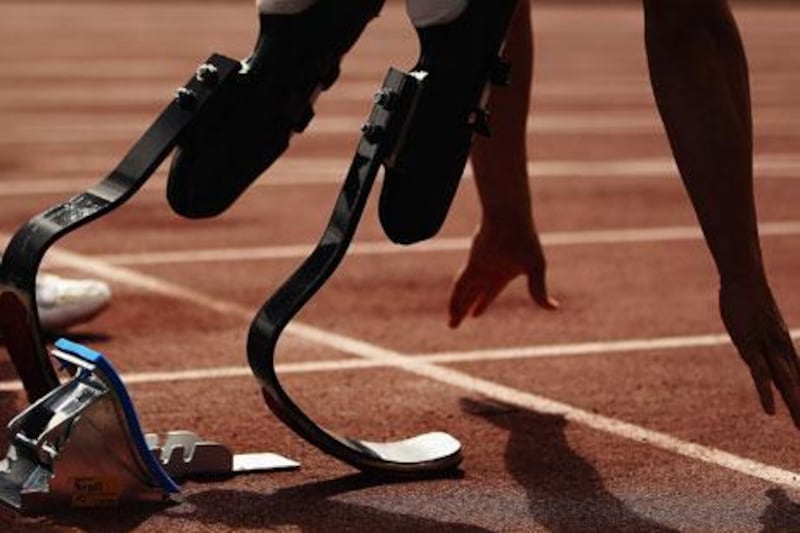Oscar Pistorius will become the first amputee sprinter to compete at a World Championships against able-bodied rivals later this month but the South African accepts there will always be voices saying his carbon-fibre prosthetic blades give him an advantage.
Far from getting him down, however, the doubters spur him on and fuel his desire to reach greater heights.
The 24-year-old double amputee, nicknamed “Blade Runner”, has been selected to run in the 400 metres and 4x400m relay, in Daegu, South Korea, after smashing his personal best last month, at a meet in Ligano, Italy, to reach the World Championships and Olympic Games “A” standard qualifying time.
That success was the fruition of two-and-a-half years of hard training, he said.
Pistorius celebrated another notable achievement in his career with an eye-catching time of 45.07 seconds, not far behind the 44.61secs set in London by the Grenada teenager, Kirani James, the fastest one lap the year.
However, a leading South African sports scientist, Dr Ross Tucker, said allowing Pistorius to run at the World Championships was a “farce”.
“I don’t like being called, in essence, a cheat, when I know how hard I work,” Pistorius said in a telephone interview from his home in Pretoria after enduring a heavy training session in cold temperatures and through a hailstorm.
“I graft extremely hard and have sacrificed a lot to get where I am. If my prosthetic legs gave me such an advantage then every paralympic athlete would be running the same times I run.
“I know that I would never be in this sport if I had the smallest doubt in my mind that I had an advantage.
“Ninety-nine per cent of people do know what the facts are, and I can’t be bothered with the one per cent that don’t.”
Pistorius, born without a fibula in both legs, fought long and hard for the right to line-up on the track in able-bodied competition.
Initially banned from running in able-bodied events by the International Association of Athletics Federations (IAAF) in 2007, he appealed successfully to the Court of Arbitration for Sport and the decision was revoked in 2008.
The sport’s highest court determined that Pistorius’s biomechanics were only tested at full-speed when he was running in a straight line, unlike an actual 400m race that would have a curve. He has little time for the scientists who maintain his blades allow him to run at the same speed as able-bodied athletes while using less energy. While he says he has the full support of the IAAF and respect from his competitors, it is those “outside the athletics fraternity” who are stirring the pot.
“It’s a minority of people that don’t agree with the science that has been done, that are very vocal and maybe ill-informed,” Pistorius said. “I’ve come to terms with the fact that I will always have people that criticise me. I can’t spend the rest of my career worrying about it.
“Everybody is entitled to their opinion ... but it is not my job to prove them wrong.
“I’m not a scientist, I’m an athlete. The IAAF are very happy to have me in their races and my competitors are happy.”
Pistorius said he was in great shape for his World Championships debut in Daegu, where he is sure to generate plenty of attention.
“I’m very excited ... a bit nervous ... a lot of mixed emotions, but they are all positive,” he said.
“It’s an amazing time in my career, to be able to qualify to run in an IAAF World Championships ... at such a prestigious event. It’s also a learning curve.
“I need to go there and run my best, be open minded and gather as much experience as I can for next year’s competition and the future.”





